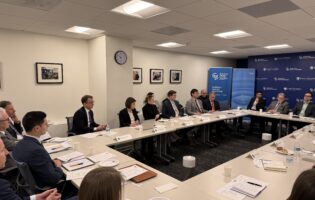EU – Further Enlargement after Croatia? Does Further Integration Exclude Further Enlargement?
On July 31, 2012, AGI hosted a roundtable discussion on the future of the EU with German Deputy Foreign Minister Michael Link. The event was supported by the Foreign and Domestic Policy Program. Mr. Link applauded the strict economic reforms implemented by the accession countries to the European Union from Central and Eastern Europe during the post-1989 enlargements. Mr. Link argued that Spain, Portugal, and Greece, all states that joined prior to this stricter process, are now undergoing these delayed reforms, but have to do so faster and find themselves under far greater stress. As a result, Europe must complete this turbulent reform to overcome its current economic obstacles.
Mr. Link also noted the political challenges ahead. All member states must adhere to EU rules to avoid corruption and organized crime. Mr. Link called for new instruments in the case of non-compliance with EU norms and values. Mr. Link also tasked policymakers with making better use of existing treaties, namely increasing the use of qualified majority voting for decision-making. He noted that this move is likely to face opposition from some member states.
In this context, Mr. Link has a positive outlook on enlargement as an opportunity to expand the institutionalized “European” values to states in the Western Balkans and Turkey. He denied the challenge that integration and enlargement are mutually exclusive. Rather, noting that enlargement stabilized post-Cold War Eastern Europe and has historically never been an obstacle to integration, he reinforced the concept that Europe cannot just be confined to a geographical area, but more importantly stands for a set of values.
Turning to summarize the progress of candidate countries, including Turkey, Serbia, and Macedonia, Mr. Link asserted that enlargement is continuing and has not lost momentum. He specifically referenced continued and increased funding for the European Neighborhood Policy (which now stands at €12 billion) and the “Pre-accession and Assistance” line-item in the EU budget. Meanwhile, with respect to non-candidate countries in Europe, Mr. Link applauded the Action Plans for Visa Liberalization for Moldova and Ukraine as a masterful use of soft power to foster closer relations between these states and the EU and their convergence with EU norms. Similarly, Mr. Link mentioned the immense potential benefits of free trade agreements with Tunisia, Morocco and Jordan.
With respect to Turkey, Mr. Link suggested the concept of “progressive or partial integration,” should complete integration of Turkey not be possible. This could entail e.g. participation in the European single market. This reflected his overall message that the path to EU membership should remain open, while basing the EU on a firm set of common norms and values.
About the speaker: Mr. Link has been a member of the German Bundestag since 2005 and was appointed as Minister of State at the Federal Foreign Office and Commissioner for Franco-German Cooperation earlier this year. He joined the FDP in 1986 and has served in several capacities, most recently as treasurer in Baden-Württemberg since 2006. He is a member of the executive committee of the Europa-Union, member of the German Council on Foreign Relations, the German Association for Eastern European Studies, the Southeast Europe Association, the German Atlantic Association, the Workers’ Samaritan Federation, and active in the hospice movement in Germany. Mr. Link has studied at the universities of Augsburg, Lausanne in Switzerland and Heidelberg.
Contact
Kimberly Frank







